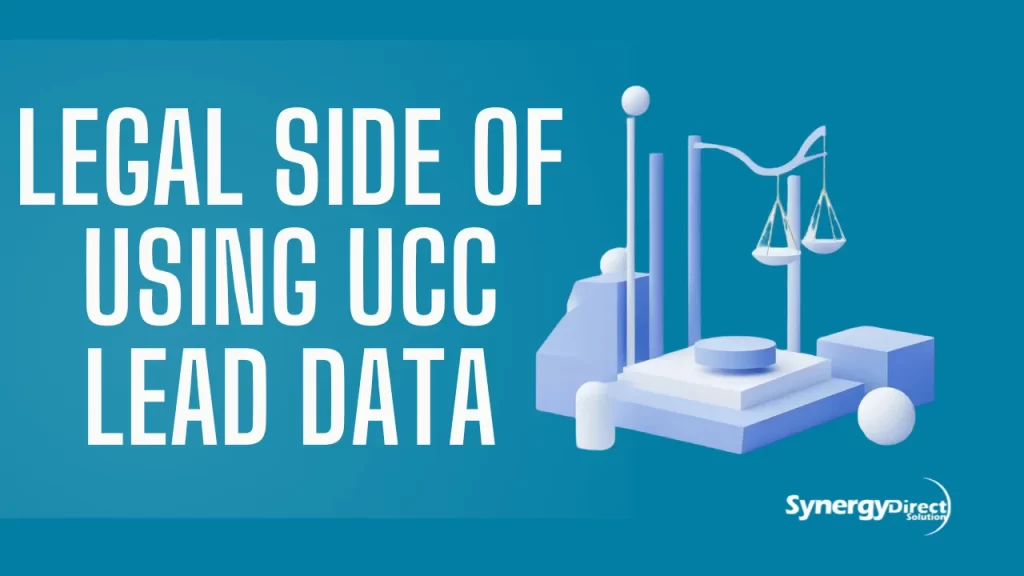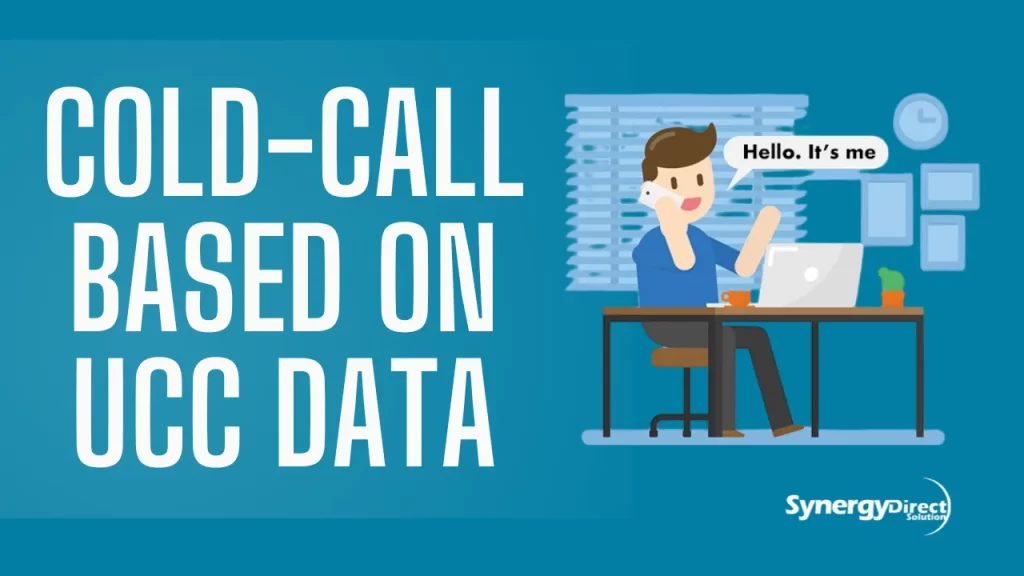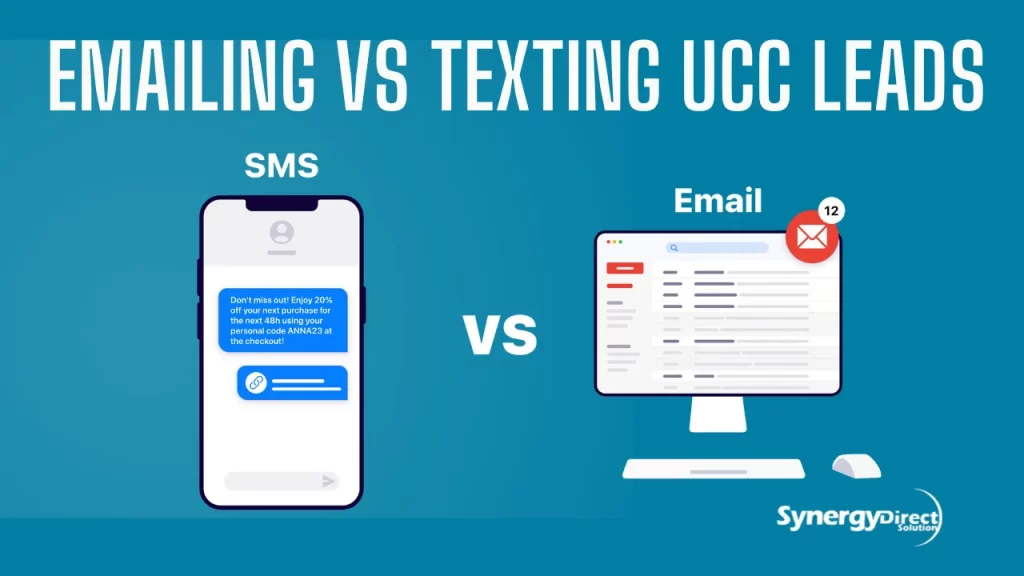The Legal Side of Using UCC Lead Data
Uniform Commercial Code (UCC) filings provide a goldmine of information for marketers, lenders, and entrepreneurs. UCC lead data, derived from these filings, can offer insights into businesses’ financial engagements, particularly secured transactions. However, while the commercial potential of this data is immense, leveraging UCC lead data comes with legal responsibilities.
This article dives into the legal side of using UCC lead data, offering a comprehensive overview of where the data comes from, how it can be used lawfully, what restrictions apply, and how businesses can stay compliant. If you’re planning to use UCC leads in your marketing or sales strategy, understanding the legal implications is crucial.

What Is UCC Lead Data and Why Is It Valuable?
UCC lead data originates from UCC-1 financing statements filed with a Secretary of State’s office. These filings are public records and indicate that a lender has a secured interest in a debtor’s personal property. The primary elements in UCC filings include:
- Name and contact information of the debtor (business or individual)
- Name of the secured party (lender or creditor)
- A description of the collateral involved
- Filing and expiration dates
Because these filings are publicly accessible, marketers and data companies extract this information and turn it into “UCC lead data.” The value lies in the fact that the entities listed are actively seeking or have obtained financing—indicating a higher likelihood of needing financial products, equipment leasing, business loans, or related services.
What is the most important UCC rule?
One of the most important rules under the Uniform Commercial Code (UCC) is UCC Article 2, which governs the sale of goods. This article lays the foundation for how contracts for goods are formed, interpreted, and enforced. A particularly vital rule within Article 2 is the “perfect tender rule”—it states that a buyer has the right to reject goods if they fail to conform exactly to the contract.
This rule protects buyers and ensures sellers meet high standards in fulfilling agreements. However, the UCC also allows for flexibility by permitting sellers to cure a defective tender within the contract period. The balance between strict compliance and commercial reasonableness makes this rule essential to the functioning of fair and predictable business transactions.
Can You Cold-Call Based on UCC Data?
Yes, you can cold-call based on UCC data, but it must be done carefully and within the boundaries of federal and state laws. Since UCC filings are public records that typically include business entities, cold-calling these leads for B2B purposes is generally permitted.
However, your outreach must comply with the Telephone Consumer Protection Act (TCPA) and Do Not Call (DNC) registry regulations. If the phone number listed in the UCC data belongs to an individual or sole proprietor, special rules may apply, and prior express consent might be required, especially for calls made using auto-dialing systems or pre-recorded messages.
Additionally, you should always honor opt-out requests, identify yourself clearly, and avoid deceptive practices. To reduce legal risk, businesses should screen numbers against the national DNC list and maintain internal compliance policies for telemarketing activities. Cold-calling based on UCC data can be effective when done lawfully, respectfully, and with a strong understanding of regulatory obligations.

How UCC Data Is Public Information?
UCC (Uniform Commercial Code) data is classified as public information because it is part of a legally required public filing system that supports transparency in commercial transactions.
When a lender files a UCC-1 financing statement with the Secretary of State or an equivalent state agency, they are publicly declaring a secured interest in a borrower’s personal property or assets. This notice helps protect the rights of both the lender and potential future creditors by establishing priority in case of borrower default or bankruptcy.
The UCC system was designed to be public by nature to reduce fraudulent claims and hidden liens. By allowing open access to UCC filings, businesses, financial institutions, and legal professionals can verify whether assets being pledged as collateral are already encumbered. This system reduces risk and supports responsible lending and borrowing practices.
UCC filings typically include:
- Debtor’s name and address
- Secured party (lender) details
- Description of the collateral
- Filing date and document number
Because this information involves commercial entities and loan security interests—not sensitive personal data—it is made accessible through state-managed databases, often searchable online for a small fee or even free of charge in some states. Third-party data providers also aggregate UCC data, offering businesses tools to identify recent commercial borrowers, making it a rich resource for B2B marketing, sales prospecting, and competitive research—provided it’s used within legal and ethical boundaries.
TCPA Compliance and Best Practices
The Telephone Consumer Protection Act (TCPA) is a critical U.S. law that governs telemarketing practices and protects consumers from unwanted communications such as robocalls, auto-dialed messages, and unsolicited text messages. To maintain TCPA compliance, businesses must obtain prior express written consent from recipients before sending marketing messages via automated systems.
It’s essential to clearly disclose the nature of the messages, provide opt-out options, and retain documentation of consent. Best practices include regularly updating consent records, honoring opt-out requests immediately, and avoiding communication during restricted hours (typically before 8 a.m. or after 9 p.m. local time).
Additionally, businesses should train staff on TCPA regulations and consult legal counsel when developing marketing strategies that involve phone or SMS communication. Following these practices helps organizations avoid costly fines and fosters trust with consumers.
Emailing vs Texting UCC Leads
When reaching out to Uniform Commercial Code (UCC) leads—businesses that have filed UCC financing statements—it’s crucial to understand the differences between emailing and texting in terms of effectiveness, compliance, and user experience. Emailing UCC leads allows for longer, more detailed messages and attachments, making it ideal for explaining complex financial products or introducing lending services.
It’s also more cost-effective for mass outreach and generally considered less intrusive. However, emails may land in spam folders or be ignored due to inbox saturation.On the other hand, texting offers a higher open rate and immediate visibility, which can lead to faster engagement. It’s more personal and harder to ignore, making it effective for quick follow-ups, reminders, or simple introductions.
However, texting UCC leads comes with stricter compliance requirements under laws like the TCPA. You must have proper consent before sending marketing texts, and recipients must have an easy way to opt out. The best approach often involves combining both methods—using email for in-depth communication and texting for timely follow-ups—while always ensuring compliance and respecting user preferences.

What states are the UCC used in?
The Uniform Commercial Code (UCC) is utilized in all 50 U.S. states, as well as the District of Columbia, Puerto Rico, and other U.S. territories. It was developed to standardize and simplify commercial transactions across state lines, ensuring consistency in areas like sales of goods, negotiable instruments, and secured transactions.
Although each state has adopted the UCC, they may have made slight modifications to better suit their legal environment. Despite these minor differences, the core principles and structure remain uniform, which makes the UCC a crucial tool for businesses operating nationally. Whether you’re in California, Texas, New York, or any other state, the UCC plays a fundamental role in governing business transactions and legal contracts.
Conclusion
Understanding the legal side of using UCC lead data is essential for any business seeking to leverage this powerful resource in a compliant and effective way. While UCC filings provide a valuable window into commercial borrowing activity, they also come with important legal obligations, especially when it comes to outreach methods such as cold-calling, emailing, and texting. Adhering to regulations like the TCPA, respecting public data boundaries, and practicing ethical marketing not only protects your business from fines and penalties but also builds credibility and trust with your target audience. By combining informed strategies with legal compliance, organizations can unlock the full potential of UCC lead data while staying on the right side of the law.
FAQS
What is the most important UCC rule?
One of the most important rules under the UCC is found in Article 2, which governs the sale of goods. A key principle within this article is the “perfect tender rule.” This rule states that a buyer has the right to reject goods if they do not conform exactly to the terms of the contract. It ensures buyers receive precisely what they agreed to and places pressure on sellers to meet those terms fully. However, the UCC also introduces flexibility by allowing sellers to correct or “cure” any issues within a specific time frame. This combination of strict compliance and practical flexibility makes Article 2—and the perfect tender rule—crucial to maintaining fair and efficient commercial practices.
